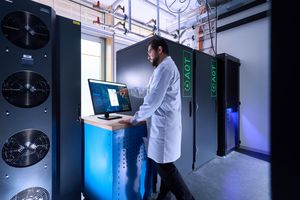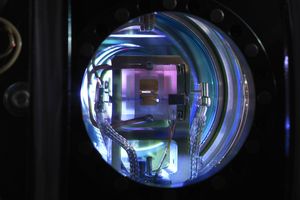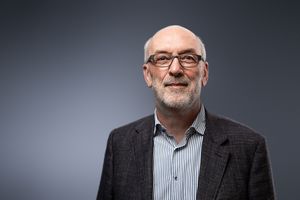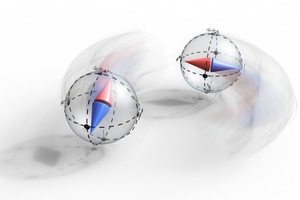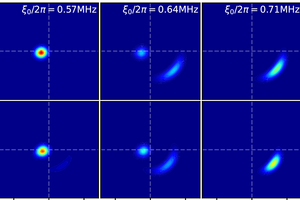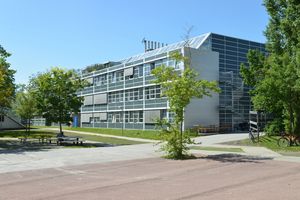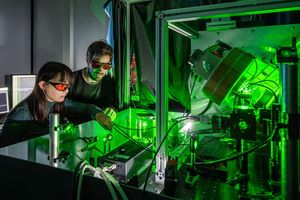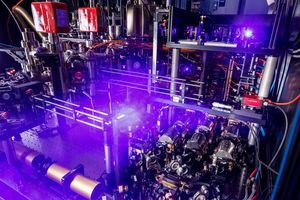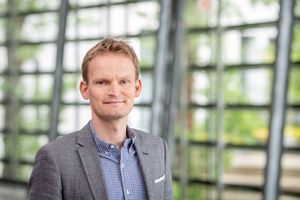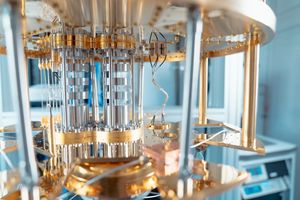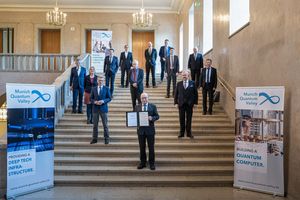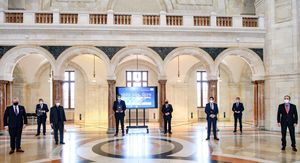
News
Ion-trap quantum computer ready for novel research and development at the LRZ
The ion-trap quantum computer from Alpine Quantum Technologies, procured by the Leibniz Supercomputing Centre and Munich Quantum Valley, is now operational at LRZ's Quantum Integration Centre, making it the first of its kind in a computing center.
A trapped-ion quantum computer for Munich Quantum Valley
In cooperation with Munich Quantum Valley, the Leibniz Supercomputing Centre is procuring a quantum computer based on trapped-ion technology.
Rudolf Gross becomes new Scientific Director of Munich Quantum Valley
On 1 August 2023, Prof. Dr. Rudolf Gross becomes Scientific Director of Munich Quantum Valley (MQV) and Managing Director of Munich Quantum Valley e.V.. The physicist will take over the tasks from Prof. Dr. Rainer Blatt, who hands over the baton to Rudolf Gross after about two years.
Magnons Prefer a Sense of Rotation Dancing the Waltz
A team of researchers from the Bavarian Academy of Sciences and Humanities (BAdW), the Technical University of Munich (TUM) and the Universidad Autónoma de Madrid (UAM) have demonstrated nonreciprocal behavior of magnons in an insulating antiferromagnet, allowing the development of nonreciprocal magnonic devices.
A 40-year journey towards understanding the Duffing oscillator
A team of researchers from the Bavarian Academy of Sciences and Humanities (BAdW) and the Technical University of Munich (TUM) have resolved a longstanding discrepancy between the classical and quantum description of the nonlinear Duffing oscillator by studying the quantum dynamics of a model system consisting of a tunable nonlinear superconducting resonator.
About 1.2 million euros for doctoral scholarships
As part of the Munich Quantum Valley (MQV) initiative, the Free State of Bavaria is supporting six outstanding doctoral students in their research in the field of quantum sciences with doctoral scholarships of around 200,000 euros each. The internationally selected top talents will conduct research at the Friedrich Alexander University Erlangen-Nuremberg (FAU), the Ludwig Maximilian University Munich (LMU) and the Technical University of Munich (TUM).
Nearly 17 million euros funding for Lighthouse Projects
With funds from the Hightech Agenda Bavaria, the Free State of Bavaria is supporting five basic-research projects in the field of quantum sciences with a total of about 17 million euros as part of the Munich Quantum Valley initiative. Acknowledging the expertise available at universities and research institutions throughout Bavaria, the interdisciplinary and cross-university Lighthouse Projects promote Bavaria's leading role in the field of quantum technologies.
Max-Planck scientists found planqc to build highly scalable quantum computer
Quantum computing startup planqc today announced a financing round of EUR 4.6 million led by UVC Partners and Speedinvest. With this funding, planqc will develop a highly scalable quantum computer operating at room temperature that is based on atoms trapped in optical lattices. planqc was founded by a team of scientists from the Max-Planck-Institute of Quantum Optics and Ludwig-Maximilians-University Munich and is the first startup to emerge from Munich Quantum Valley, one of the leading quantum technology hubs in Europe.
First Bavarian Distinguished Professorship awarded
The first Bavarian Distinguished Professorship has been awarded to Prof. Dr.-Ing. Robert Wille, who previously taught in Linz and now holds the newly established Chair for Design Automation at the Technical University of Munich (TUM). As part of Bavaria’s Hightech Agenda, the Distinguished Professorship Program is intended to bring standout scientific experts to Bavarian universities. Each appointment made in the program is endowed with as much as five million euros for five years.
Around 20 million euros for new professorships in Bavaria
The universities in Augsburg, Würzburg, Erlangen-Nuremberg and Munich, as well as the technical universities of applied sciences in Regensburg and Nuremberg, will receive around twenty million euros in funding from Bavaria's High-Tech Agenda to enable them to further strengthen their profile in quantum sciences and quantum technologies.
When quantum particles fly like bees
A quantum system consisting of only 51 charged atoms can assume more than two quadrillion different states. Calculating the system's behavior is a piece of cake for a quantum simulator. Yet even with todays supercomputers it is almost impossible to verify the result. Researchers of the Munich Quantum Valley (MQV) initiative and the University of Innsbruck have now shown how these systems can be described using equations from the 18th century.
Fit for quantum: Around one million euros for teaching in quantum technology
Making young scientists fit for quantum technologies: The universities in Augsburg, Bayreuth, Erlangen-Nuremberg, Munich, Regensburg, and Würzburg will each receive around 144,000 euros in funding from the High-Tech Agenda Bavaria.
Foundation of the Munich Quantum Valley e.V.
Just one year after the Bavarian state government issued its declaration of intent, the founding document was signed ceremonially at the Bavarian Academy of Sciences and Humanities to mark the formal establishment of the Munich Quantum Valley as a registered association. Supplementing the funding of 300 million euros from Bavaria’s Hightech Agenda the initiative’s members have already raised federal funds totaling more than 80 million euros.
Munich Quantum Valley kicks off
Bavaria's leading scientists and universities kick off a new research initiative to promote quantum science and develop new quantum technologies. The Free State of Bavaria is supporting the project with 300 million euros.
